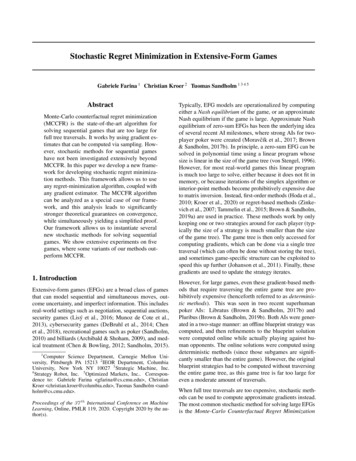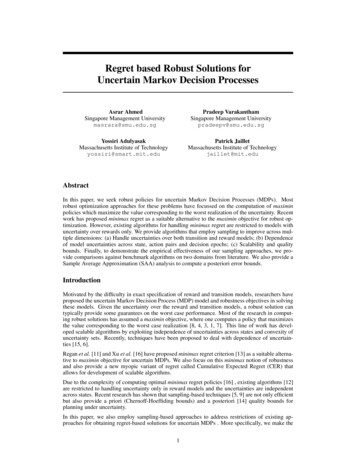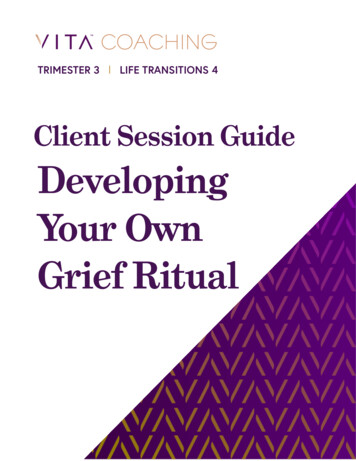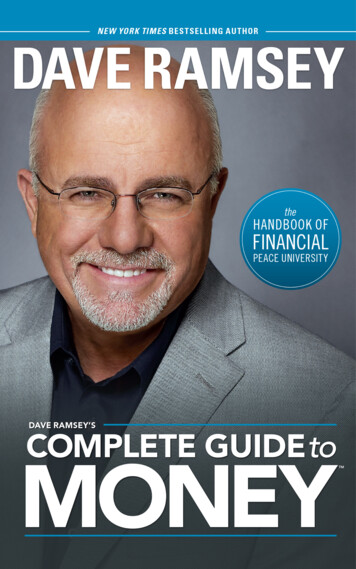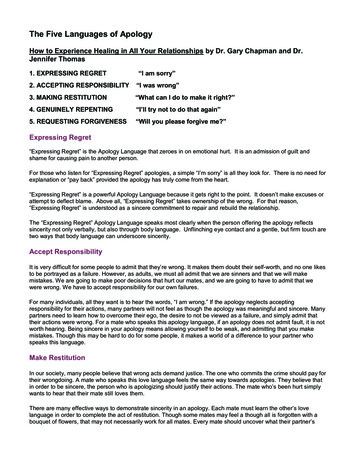
Transcription
Your Guide to No-RegretHomeschoolingLee GilesCopyright 2021All Rights Reserved
Making a No-Regret DecisionThis isn’t going to be long because this doesn’t have to be complicated. Youare thinking about homeschooling, so you already have reasons to considerit. Or maybe you've already decided it's what you want to do, but aren't fullyconvinced it's what you should do. Many reasons that push families tohomeschool are fear-based: fear over what they are teaching at schools, fearover how your child has been or might be treated, fear over violence, andnow fear over disease spreading through schools.I want to offer you a different perspective. Personally, I always want toavoid any fear-based decision. I don’t want fear ruling my life. I want mylife ruled by love instead. I want you to look at the decision to homeschoolfrom the perspective opposite of fear-- one of love.Who loves your child more, you or the state? Homeschooling is a simpledecision when you look at it from the perspective of love. No one loves yourchild more than you do. No one is going to care about your child more thanyou do.Yes, there are awesome teachers out there that care about their studentsand are experts in their field, but they can’t ever care about your child theway you do. No matter how dedicated they are, they can’t tailor their dayand their curriculum to fit your child. They can't know your child the wayyou do.
You, however, even if you have multiple children and other demands, aremore equipped to adapt and mold your child’s education in the way that’sbest for them.Curriculum standards are one-size-fits-all, but we know each child isdifferent. Each human is unique, even identical twins. School could nevergive them the love and care that you can.If you decide to homeschool out of love, then you will not fail your child.Love never fails. That’s a timeless truth. If you are homeschooling out offear, you could fail. If your only motivation is to keep them away fromschool and not to provide and support your child’s education, then yourchild will be at a loss.Getting that “why” down will be the most important step towards no-regrethomeschooling. Homeschool your children simply because you love them.That love will never change, so your motivation will never change. Therewon’t be waffling in your decision.It’s pretty simple to feel confident that you love your children more than thestate does. You can apply the same confidence towards anyone whoquestions your decision to homeschool. You can shrug it off withoutoffense. While they may care about your family, you will know that theydon’t love your child as much as you do. No one else has that parent-childbond with your child.*Deciding to send your child to school is not a sign of not loving your child. But, if that’s yourdecision, make it out of love and not fear!
Moving Forward with No RegretsOf course, after we make the decision to homeschool, insecurities start tocreep in. Yes, we love our children, but is that enough? I’m not a teacher. Idon’t get math. I am already busy. Won’t it cost a lot to do it well? What if Ican’t do it? What if what I have to give my child isn’t enough?Here comes our next step towards no-regret homeschooling. We need tomake a decision on how to approach homeschooling. We can’t let panicforce us into a wrong choice here. We need to choose with the confidencewe built with our choice to homeschool in the first place.The fear decision would be to imitate what the schools do, the fear beingthat your child will get behind and not learn what the kids in school arelearning. This leads to desks in rows, thick overpriced textbooks, veryexpensive online schools, intensive all-day online programs, and other suchstress-inducing options.The fear is that what you offer your child might be somehow less than whatthey would get in school. But, remember, you’ve already decided that whatthey have to offer in school isn’t what you want for your child. If school iswhat you wanted for your child, you’d send them there. If you’ve alreadydecided not to send your child to school, why would you want to replicateit?Then there is the self-doubt, looking at others and comparing them toyourself. These other homeschoolers have their stuff together. Their kids
are so accomplished. The fear-based decision would be to just imitate them,hoping to replicate their children’s success. While there’s nothing wrongwith gleaning wisdom from those who have gone before, there’s a bigproblem with just doing what others are doing simply because you don’twant to take responsibility for the decision yourself.We have to deal with the underlying fear of the responsibility of educatingyour children. Educating your children is not separate from parentingthem. We love them. We do our best to guide them. They ALL will makemistakes because we’re all raising humans. One mistake, one bad decisionhas ruined some lives, but a loving family doesn’t lose it at that point. Aloving parent doesn’t have their identity wrapped up in their children. Theirchildren’s success is a joy to them, and their failures aren’t anembarrassment, but a place to reach out in love to help them back up andon their way. Regardless of whether your child goes to Harvard orcommunity college or skips college altogether, what they do or don’t do isnot a reflection of your self-worth.Love keeps no record of wrong doing. Love doesn’t hold anythingyour child does against them. Love forgives. Love keeps its armsopen. Love doesn’t say, “After all I did for you ” Love says, “Iwould do it all again.”So, let’s look at the flip side of deciding how we will approachhomeschooling: the love-based decision. You love your child. You knowyour child best. You know your family. Your decision as to how you willapproach homeschooling will be as unique as your child and your family.
I like to say that homeschooling is just an extension of parenting. You havebeen teaching your child their whole life. You taught them their first words.You taught them what a tree was. You taught them how to use utensils.You’ve been teaching them all along. Why should it stop now? You weremade for this.Each family has its own unique culture. Each family is made up of differentpeople, so each family interacts in different ways. There are some generalcategories such as those families who run their lives by schedule and enjoyeach day being the same, and those who like adventure and flying by theseat of their pants. Some families have movie nights, and some read aloudto each other. Some families are large and have lots of extended familynearby for lots of gatherings, and some are small and spend most of theirtime by themselves.We like to categorize everything like that, but the truth is life isn’t that neatand orderly. We’re all a mix of lots of different things. And that mix in eachof us as humans mixes with the mix in the other humans we live with,creating our family secret sauce that no one else has.Your parenting is unique. No one else’s home is just like yours. It can’t be.It’s made up of different people. You may have things in common withthem, but you have different families. You have different traditions,customs, not just big things like holidays, but the day-to-day traditions andcustoms. Do you rise early without an alarm and open the kids’ bedroomdoors with a song on your lips to wake and ready them for the day? Do you
drag out of bed on the fourth snooze after your kids are already up andcerealed and watching TV?We all do things differently. My family sits down together for a homemadebreakfast each morning, but lunchtime is a free-for-all-survival-style-everyman-for-himself experience. To each his own.Our families are different. Our parenting is different. Each relationship isunique, so the parents’ relationship with each child is different, even withinthe same family. People are unique. You are unique. Your kids are unique.Your family is unique. Your parenting is unique to you, and yourhomeschooling will be unique to you.That’s the point of all that. Be your own homeschoolers. Just like we don’twant to look to the school and copy that, we don’t want to look to others tocopy them. They aren’t you. They will never be you. Their kids are notyours. You don’t want your kids to be their kids. You want your kids to bethemselves. Let your kids be themselves and don’t try to push them intosomeone else’s mold.I hope you can agree that you want your kids to be raised to be all they canbe, not all that someone else has decided they should be, including you.Love your kids enough to want them to grow into who they were created tobe, not your idea of who they should be.We need to be clear on our love motivation. We can’t let selfishness creep inand start looking at ourselves. We need to make sure we’re free of those
self-doubts and insecurities that say my kid’s success in the eyes of theworld determines my worth.We need to homeschool out of love. Love is selfless.We can homeschool without regret because our motivation is love and lovenever fails.
No-Regret Homeschool DaysWe’ve got our motivation down. We know we’re committed tohomeschooling. We know we don’t want to just copy the world around us.But what do we do?We all want someone to step in and say “do this.” It would be a relief, right?It would lift the responsibility off of ourselves to make the “right” decision.But we’ve already established that no one can tell you what’s right for yourfamily.If you are a praying person, now’s the time for prayer if you haven’t beenpraying over this decision yet.While I won’t tell you what to do, I will give you some guideposts. I’ll talkmore about each one, and then I’ll give you an easy way to get startedaccomplishing them.1. Cover the basics. Your child should read, write, know arithmetic, andlearn about the world around them.2. Set your child up for success. Don’t force a curriculum on your childthat’s too hard. Yes, challenge your child, but a successful child iseager to learn. A defeated child just wants to retreat.3. Move at your child’s pace. If they are excited, let them spend extratime on it. If it’s becoming a burden, break it into parts and just do
part each day, or straight up take a break and come back to it anothertime.4. Give your child time and space to pursue their interests.Let’s look at each of these features that should be part of everyone’shomeschool. First, cover the basics. You want your child to be educated.That’s a basic desired outcome of homeschooling. They should get the“three R’s” and learn about the world around them, which would includeyour history and science.Reading is foundational. There are different ways to do it. I start with sightreading with most kids because it gets them reading faster and morefluently. You read by sight, so sight reading is the end goal. Phonics isactually just for decoding words you don’t yet know by sight. It’s a tool, nota reading technique.Writing follows reading, though the two can be taught simultaneously.Reading starts with the alphabet. They can trace the letter and not only sayits name but its phonetic sound, “D, dee, duh.”They can write the sight words they are learning to add a physical dynamicto the process. Children, however, will progress at different rates. Theymight learn to read earlier than they can master writing. Let your childprogress independently in their different skills.For older kids it’s most important to just be reading daily. That is muchmore important than the level they are reading at. The research supports
this. Reading for twenty to thirty minutes a day will set your child up forsuccess.Writing has rules of grammar that need to be learned, but they should beseparated out from writing. You’ll need to decide how to provide those basicgrammar lessons. They can even come from just copying good literatureand then looking at how it’s written. Why is there a comma there? What dothe quotation marks show? What does this word describe? There are termslike adjective that they will need to learn for the sake of “getting aneducation.”But apart from that, your child should write stories. These can be creative,but they should also be non-fiction, just telling about their life. They needto learn to state a topic, and add details about it, and come up with anending. These should be more about content and structure than worryingabout spelling and grammar.Math starts with counting. You don’t need a book for that. You can countaround the house, outside on walks, whenever, wherever. Math benefitsfrom structure and building on itself. The early years can focus on learningmath facts and basic concepts of geometry, time, money, graphs, andfractions. These can all be taught without a book. But eventually, you’llwant to move to a systematic approach to make sure they are getting thestepping stones to keep building towards higher math.History and science can be learned through books, videos, field trips, etc. Itdoesn’t have to come through a textbook. You can choose a topic like
explorers, pioneers, World War I, the Space Race, ancient Egypt, and so on,and just learn all you can about it, including history and science andliterature and music and art and anything else you find along the way. Useyour library and request all they have on the topic, from books andmagazines to videos. Give your child a shelf or bin for the current topic andlet them explore what’s there freely.As they get older, maybe third grade, you can move into a more organizedcurriculum to expose your children to all sorts of things and not just thethings they already knew about to want to learn more. I encourage you tolet your child explore their interests, but I also encourage you to let them dothat on their own time. If they really want to learn, they will. They don’tneed to be “forced” to do it. School time can be to explore new things andfind new interests. And if it doesn’t interest, then it’s over and done whenschool’s finished for the day and they can go learn more about those thingsthat interest them.Second, set your child up for success. When choosing a curriculum anddeciding on levels and placement, keep this in mind. You want your child tobe successful. Find the place where they can feel successful and moveforward from there.Success breeds excitement and intrinsic motivation to continue on. Defeatbreeds discouragement. It doesn’t mean it has to be easy. It doesn’t meanthey should never get something wrong. But the getting something wrongshouldn’t leave them feeling it’s impossible. The getting something wrong
should be an obstacle they can overcome and then feel all the moreencouraged that they can do it.If your child is struggling to read independently, let them use audio booksto read along, so they are getting exposure to different levels of books. Youcan and should adapt to your child.I have some kids who were independent readers at age four, reading novelsfor fun at five. I have some kids who weren’t really independent readersuntil they were ten. These are all siblings, my children. It just didn’t fullyclick for some until they were older. They will never be the voraciousreaders those first kids are, but they don’t have to be. That’s not who theyare. But it’s clicked for them and they can pick up and read whatever theywant now. And they do read just for fun.Third, move at your child’s pace. This would be related to what I’ve saidbefore about kids learning at different speeds and even the same childlearns different skills at different times. If the math is easy, it’s okay to letthem go ahead and do more to some extent. It’s not a bad idea to leavethem wanting more, and you don’t want burn out, but let them do more ifthey want to. If they are excited to learn, that’s a good thing.When you come to the subjects that are harder and a struggle, it’s great toteach them to push through and get it done, but it’s also good to say “we’lldo half today and finish tomorrow.”
My daughter graduated high school with probably a seventh-grade matheducation. She worked on math all through graduation. That’s just as far asshe got. She has autism and math was a particular struggle for her. She stillgot a full college scholarship. She excelled at what she was excellent at andthat’s what the college cared about. (Side note: Now she’s a senior incollege, and has decided she wants to learn algebra. She’s ready for it now,and she’ll learn it much better than if we pushed through in high school justfor the sake of doing it.)That leads us to the last point: give your child time and space to pursuetheir interests. I believe in keeping school short and sweet, and then lettingyour child spend their time on their interests.I want my kids to be educated. I want them to learn the basics really well,but I want them to do the things they care about and become experts atthem.We become an expert at something by devoting lots of time to it. The onlyway we’ll devote a lot of time to something is if we love it, enjoy it. Mydaughter excelled at art because she loved it and spent a whole lot of timeon it.My son excels at 3D modeling because he really enjoys it. He sets his alarmfor six in the morning to get up and get working. He’s gotten multiple fulltime job offers from companies who sought him out for the skills they see inhis work. That’s all while he was still a teenager.
No-RegretEasy Peasy HomeschoolingI want to leave you with my best tool for helping you homeschool. It willenable you to meet all four of those points I just laid out. I have created afree online curriculum called Easy Peasy All-in-One Homeschool. Itsmission is to make homeschooling possible even if you think you lack thetime, money, or know-how.It covers every subject; not just the core subjects, but also things like art,music, PE, computer, foreign language. It’s all available for free online. Wedo offer low-cost books if your family works better that way. Kids love theonline activities and books provide flexibility for when you are on the go, sosome use it both ways.Easy Peasy is a great way to get started on your first year of homeschooling.It’s an eclectic curriculum, so you’ll get exposure to learning by videos andby reading, to learning from textbooks (free online) and by completinghands-on projects. You’ll get to try out different ways of doing school as youfind what works best for your family.Easy Peasy has over 100 Facebook groups to offer you support. Every statehas different homeschool laws; we have a group for each state so you canfind help navigating those laws. We have groups for different countries aswell.
We have groups for different life circumstances such as large families,special needs kids, those in the military, those schooling from an RV, andthose homeschooling grandchildren.I would encourage you to check it out. You can find us �m going to close here and leave you with three blog posts that I havewritten that continue these thoughts. I hope they will encourage you thatyou can homeschool and can do it well.You’ve got this. No regrets!
Is It Enough?I recently received an email with the subject line, “Is it really this simple?”The real question, though, is probably one you’ve asked yourself. I know Ihave. It’s this one: am I doing enough?What does that question mean? Do you know what you are asking? Enoughfor what? To appease your doubtful parents? To keep up with the Joneses?For your child to get a job? Or to get into college on a full scholarship?What is your goal in educating your children? What are your goals for yourfamily? Do you want children who love God and family and serve others? Isfollowing the public school format of school all day and then more work inthe evening really conducive to meeting that goal?My husband and I want our children to be educated. We give them a corebody of knowledge to remove their ignorance. The curriculum I’ve designedfor my own family is one that I believe covers all of the basics and providesan excellent foundation in reading and writing, which I believe areindispensable for any future learning or career. We don’t know what thefuture will hold for our children, so we want them to be prepared foranything. We want our children to be able to get into the college of theirchoice, if they make that choice. We certainly would love for them to get fullscholarships, but we’re not going to put that pressure on them or ourselvesand make that THE goal.
I know I am doing enough. For our family, doing enough is covering thebasics thoroughly and giving our children free time to devote to theirpassions. My children are already pursuing their future work. Because Ikeep their “school” day short and don’t have them in outside activities, theyhave hours of free time every day to do what they love. My oldest child isalready getting paid to do what she loves, which is art. My next oldest isbuilding an online following for his computer work. These things, theirpassions, are what will be important in their lives, more important thantheir ability to place chemicals on a periodic table or to list the presidents.There tend to be two groups of parents who ask this “enough” question themost: those with kindergartners, who wonder why I don’t do addition andsubtraction and history and science with the five-year-olds, and those withhigh schoolers, who are wondering if what they are doing “counts.”To the moms of kindergartners I say, your children will be able to completecalculus in high school even if they wait until they are in first grade to begin“real” math. Enjoy this time with your kids. Read books together. Googlethe answers to their questions. Watch videos. Try to relax.To the moms of high schoolers I say, in some states your child could playvideo games for four years and you could call him a high school graduate.My state, Pennsylvania, is not one such state. Here are their guidelines forwhat “counts.” To count as a completed high school course a student can doANY of the following: complete two-thirds of a textbook, have 120 dailylogged entries, have 120 hours of logged study, complete a 10-page researchpaper, complete a college course, or pass an AP exam. If you follow Easy
Peasy, you’ll have 180 “daily logged entries.” You’ll be way ahead of thegame.I wrote the assignments on Easy Peasy for my children. It’s “enough” forour family, but your children are yours, not mine. If this curriculum willhelp you meet your family’s goals, then use it and be happy with yourdecision.There will always, always be someone else doing something different,something more. There have been times in the past when I’ve read on blogsabout what other people were doing for school and their kids’ amazingaccomplishments and certainly felt lacking. Well, guess what? My kids areturning out pretty amazing themselves. I bet your kids are pretty amazingtoo.I’m someone who believes that everyone has genius in them. Everyone hassomething special to offer the world. I love giving my kids not only a greateducation, but the time to discover and develop their genius, and I’mteaching them that their gift is something to use to bless others.So, I leave the question to you now. Is what you are doing enough? Whatare you really asking? Think it over. Pray it over. And I pray you come outon the other side joyful and at peace.
Is It Enough? Part 2I’ve been cringing reading one mom’s posts on my Facebook news feed.Last week the mom and her son spent two hours together completing agrammar worksheet that he then got a 79 on. Her son is in second grade.This week she didn’t even know the meaning of several of the words shewas supposed to read to him to practice for his spelling test. Why would oneneed to know how to spell “argosy” if one is never, ever going to write thatword?I’m sure her son is getting a rigorous education. I hear about rigorouseducation all the time. I think it must be a buzzword of the moment becauseeveryone is claiming their school, their curriculum, their standards arerigorous. I’d rather have peace and joy in my home than rigor.I get a lot of questions from people coming out of the school system aboutwhere the spelling test are. EP has none. The kids learn the phonics behindspelling, practice some spelling, but mostly they write. That is, of course,the context where spelling is used. But spelling brings me to another point.If your child is really interested in spelling, then by all means give yourchild a dictionary and quiz her on the spelling of argosy. But if not, whydrill and practice things that will be forgotten tomorrow and were neverneeded in the first place?That’s all part of the philosophy behind EP. Give them a strong foundationwhere it matters. Expose them to a variety of subjects. Let them do morewhere their interests lie.
My one son reads history books for fun. I don’t have to push it on him. Idon’t make him memorize. He learns the names and places and datesbecause it’s interesting to him. That kind of learning sticks. In the subjectshe doesn’t care about, I let it be “enough.”Now a word of caution here. When your kid is excited about chemistry (andwho doesn’t like explosions and slime), don’t go crazy and run out and buya science kit. If your child really cares, they will make it happen on theirown, including bugging you until you do get that kit. You don’t have tochase after a child’s whims trying to ignite a passion. When they find whatthey really like to do, they will just do it. Give your child the gift of time,space, and boredom.
The Key(This was written in 2017.) The Oscar winner for Best Original Song went toa guy who thanked his mother for letting him quit soccer to be in a musical.He dedicated his win to all the kids who sing in the rain and to all the momswho let them.I’ve written before about passion and how EP frees my kids up to spendtime on their passions. That’s what has been important to me, giving mykids a good foundation and then letting them build on it, their own way.I know it’s hard to let your kids play and explore and create and have funwhen you hear about how “rigorous” this and that curriculum orprogram is. “Rigorous” seems to be a big buzzword in homeschool circlesthese days. I’d rather have joy and peace than rigor in my homeschool day.My oldest is going off to college this fall. She’s my first “proof of concept.”She has always done school the “easy” way. School before Easy Peasy waseven easier for us. Easy Peasy was actually a longer, more involved schoolday than what we did before. My daughter is an EP kid; she was using itbefore anyone outside of our family knew it existed.My kids did all the EP lessons when they were younger, but as I’ve gottenkids into high school, I’ve let them take more of a lead on their direction. Ilet my daughter spend as much time on her art as she liked. As she gotreally focused on art, I didn’t stress over her math and science that shedidn’t like. We just moved along in math at her own pace. I wanted her to
learn, not just get through. For two years of high school science I let herchoose her subject. She did anatomy one year and spent the year drawingmuscles and bones and labeling them. The next year she studied light. Sheresearched it and wrote a big paper on it. Light was something she wasfocused on in her artwork that year. She likes history and English, so shewanted to continue with the regular EP courses in those subjects throughhigh school.So what was the outcome? She won a full scholarship to her only-choiceschool. She believed she knew where she should go to school; I trusted herand let her only apply there.It can be hard when your child wants to go into the arts or some other fieldwhere you know jobs might be hard to come by. It can be tempting to worryand to want them to have all that rigorous education when they really justwant to create. If your child is passionate and puts in the time and hardwork, then they can get good enough to be one of those ones who get tomake a living doing what they love. That Oscar winner used to be just a boysinging in the rain.My next oldest is starting a video game design company. He’s hoping tolaunch the alpha version of his first big game this year, as a freshman. Hegot his first unsolicited job offer at thirteen. I can already see that he can besuccessful at his passion, what he pours his spare time into.Is Easy Peasy the key to every child’s future? Of course not. There is a key,though. It’s called the grace of God. He gave my kids their talents and
personalities that drove them to the things they love to do. He provided freeart lessons for my daughter after I was fussing to Him in prayer about how Icouldn’t help her move forward with her art. He inspired the Easy Peasyway of school that gave my kids a great foundation and the hours to investin their work. He matched my daughter up with a school that not onlyaccepts her but appreciates her.So when I look at my eleven year old reading or making music and hisyounger brothers dancing and creating imaginative games, I try to relax.God’s got a plan for their future and it’s a good one.And a note: EP has high quality courses. There are many high schoolcourses that are based on AP courses. There are courses that use lecturesand materials from universities. I’m not saying that EP lacks in “rigor.” I’msaying I’m against rigor for rigor’s sake. There was no need for my daughterto tackle an AP physics course just so I could feel I was giving her a rigorouseducation. I hope you can see the difference. And, of course, I’m not sayingthat your kids or all my kids are going to get full scholarships. I’m justsaying that I can trust it’s going to all work out okay. I’m putting my faith inGod, not in my curriculum, not in rigorous academic standards, not inanything else.
About the AuthorLee Giles is the creator of Easy Peasy All-in-One Homeschool and motherto six homeschooled children. She and her family served the Lord overseasfor
Here comes our next step towards no-regret homeschooling. We need to make a decision on how to approach homeschooling. We can't let panic force us into a wrong choice here. We need to choose with the confidence we built with our choice to homeschool in the first place. The fear decision would be to imitate what the schools do, the fear being


